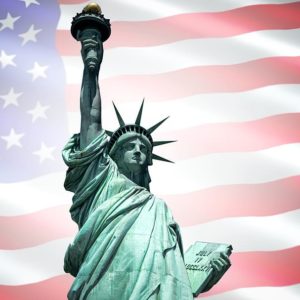“Is it hypocritical for the United States to advocate for democracy and human rights abroad while we have issues here that we don’t focus on?”
A Florida International University student asked this question during a recent event on the United States’ role in promoting democracy worldwide. The query poses a “hypocrisy conundrum” that leads some Americans to sour on the idea of the United States helping to globally expand democratic institutions.
The sentiment exists across the political spectrum, too.
President Trump expressed his reluctance as a presidential candidate to much American involvement with promoting democracy. The American Civil Liberties Union put its own spin on this conundrum by criticizing the United States’ withdrawal from the U.N. Human Rights Council. The ACLU argued the move exemplified failings at home that needed to be addressed before America could regain credibility abroad.
What’s more, there is no doubt that some Americans are frustrated with political institutions they perceive as ineffectual and out of touch with their needs. Some people also feel American democracy has marginalized various communities based upon their gender, ethnicity and class.
But this hypocrisy conundrum obscures several realities.
First, liberal democracy is the best vehicle for maximizing human potential and protecting human rights. Only democracy enshrines the individual, political and economic freedoms necessary to achieve these ends.
Second, the United States is uniquely positioned through its political and economic might to support and expand democracy worldwide.
Third, Americans are compassionate and generous. Through foreign aid initiatives like PEPFAR, and civil society organizations like Catholic Relief Services, they alleviate human suffering.
Let’s also be honest: No nation has gotten liberal democracy exactly right. And how would we reach sustained consensus on a minimum standard of “democratic excellence” to green light American engagement in the world? Is such a standard even achievable?
We must accept that democracies — even mature ones like ours — are fallible by design. America needn’t be perfect to be President Ronald Reagan’s “shining city on a hill.” We need not cut ourselves off from the world until some unattainable moment where we have everything figured out.
In fact, America’s struggles to overcome its darkest impulses, no matter how abhorrent (from slavery to hyperpolarization) give the United States greater credibility in supporting democracy everywhere. Paradoxically, the United States can be both credible and hypocritical when it comes to democracy assistance.
To better understand that point, let’s further explore the nature of hypocrisy.
In his book “Suicide of the West,” Jonah Goldberg explains: “Hypocrisy is the act of violating an ideal or principle you admonish others to follow. Too many people believe that hypocrisy is an indictment of the ideal as much as it is the hypocrite. This is folly. A world without hypocrisy is a world without ideals.”
In short, hypocrisy does not change the fact that liberal democratic ideals championed by the United States and its allies are good and should be supported the world over. Just ask people in places like Estonia and South Korea who now enjoy liberties like free speech after being denied them under tyranny.
This is not to excuse American hypocrisy, but human nature and experience dictate the United States will violate its founding principles even as it strives to live and promote them. At the same time, the evolution of American democracy, through its example of perpetual self-improvement and steeped in the pursuit of noble ideals, gives the United States credibility in the eyes of those struggling for liberty.
Look no further for proof than last year when Hong Kongers waived American flags as they pleaded for support against Beijing’s oppression.
Imagine if over the last 70 years the United States had eschewed supporting liberal democracy to avoid hypocrisy. Americans would never have challenged genocidal Axis Powers in the 1940s, would never have fought Soviet oppression during the Cold War, and would never have opposed apartheid South Africa’s racist regime.
In an interview for this Democracy Talks series, historian Robert Kagan described the United States building and maintaining the liberal democratic order as “a world of increasing democratic government, a world of increasing liberalism, a world that has mostly avoided major wars and great power conflicts, and a world that has enjoyed historically unprecedented economic prosperity.”
If you still conclude that the United States must avoid hypocrisy by stepping back from the world, are you comfortable with Beijing or Moscow’s unchecked global influence?
Keep in mind, the Chinese Communist Party’s way of doing business — brutally suppressing medical officials and obscuring the truth — had devastating implications for igniting the COVID-19 pandemic.
For reasons of individual liberty, morality, national security and economic interests, the United States must accept itself as a flawed champion of liberal democratic values at home and abroad.
And that’s the best way to answer the understandable question that student in Florida raised.

